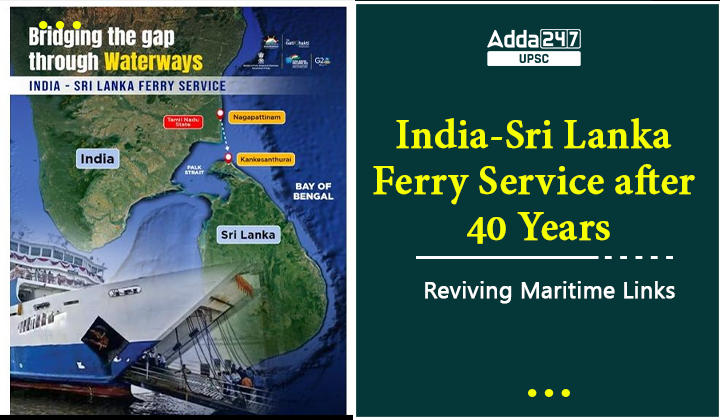Table of Contents
India-Sri Lanka Ferry Service: The Re-Establishment of a ferry service between India and Sri Lanka after four decades marks a significant milestone in the diplomatic, cultural, and economic relations between the two nations. The initiative, aimed at strengthening bilateral ties, fostering tourism, and enhancing people-to-people connections, is expected to unlock numerous opportunities and confront its share of challenges.
India-Sri Lanka Ferry Service
The historic sea route connecting India and Sri Lanka has roots dating back to the early 1900s, primarily through the Indo-Ceylon Express and Boat Mail. This maritime connection, however, was disrupted in 1982 due to the civil war in Sri Lanka, leading to the cessation of ferry services.
Efforts to reinstate ferry services began in earnest after the end of the civil war in 2009. A Memorandum of Understanding (MoU) on passenger transportation by sea was signed in 2011, leading to the launch of a similar service. Unfortunately, this attempt faltered within six months due to a poor response. Subsequent endeavors, including routes from Rameswaram to Talaimannar and Karaikal to Kankesanthurai, faced various challenges, preventing their materialization.
Cheriyapani Voyage
Inauguration of the Ferry Service
The recent inauguration of the passenger ferry service, operating from Nagapattinam in Tamil Nadu to Kankesanthurai in Jaffna, Northern Sri Lanka, signals a renewed commitment to re-establishing the age-old sea route. The High-Speed Craft, named ‘Cheriyapani,’ embarked on its journey, aiming to facilitate not only transportation but also foster ties between the regions.
Operational Details
The ferry service, operational since Saturday, boasts a streamlined schedule. Departing from Nagapattinam at 7 am, it reaches Kankesanthurai by 11 am, with the return trip commencing at 1.30 pm and concluding at Nagapattinam by 5.30 pm. A ticket cost of approximately Rs 7,670 and a baggage allowance of 40 kg per passenger indicate a focus on providing convenience and accessibility.
India-Sri Lanka Ferry Impact on Tourism
Religious Tourism
One of the potential impacts of this ferry service lies in its ability to amplify religious tourism. Pilgrims from both India and Sri Lanka can now access significant religious sites, fostering cultural exchanges and deepening historical connections.
Regional Commerce and Trade Opportunities
Beyond religious tourism, the ferry service is expected to catalyze regional commerce and trade. The ease of transportation could lead to increased exchanges of goods and services, benefiting local traders on both shores.
Infrastructure and Planning
Anticipating the Influx
As the ferry service anticipates an influx of travelers, the state government of Tamil Nadu is actively engaged in infrastructural developments. Coordination with various Union government departments ensures a smooth experience for passengers, reflecting the commitment to the success of this initiative.
Prime Minister and President’s Perspectives
Statements from Prime Minister Narendra Modi and Sri Lankan President Ranil Wickremesinghe underscore the importance of connectivity not only between the two cities but also between the countries and their people. The emphasis on hearts coming closer reflects the diplomatic significance attached to this initiative.
India-Sri Lanka Ferry Initial Challenges
Operational Adjustments by SCI
Despite the celebratory inauguration, initial challenges have prompted adjustments to the operational plan. The Shipping Corporation of India (SCI), initially planning daily services for ten days, has rescheduled to operate three times a week. Reasons, including the onset of the northeast monsoon, ticket fare, and ticketing systems, present early hurdles that need to be addressed for the venture’s success.
Ticket Fare and Ticketing Systems
Ticketing costs of Rs 7,670 and concerns about ticketing systems have emerged as significant challenges. Insights from port officials at Nagapattinam highlight the need for a strategic approach to passenger engagement, emphasizing the reduction of ticket rates and the availability of bookings on popular travel platforms.
The Road Ahead
As the ferry service navigates its initial challenges, the road ahead involves collaborative efforts between India and Sri Lanka to ensure the sustainable success of this initiative. Addressing operational, logistical, and promotional aspects will be crucial to unlocking the full potential of the maritime link.
India-Sri Lanka Ferry Service Conclusion
In conclusion, the rejuvenation of the India-Sri Lanka ferry service represents more than just a mode of transportation—it symbolizes a bridge between two nations, reconnecting historical ties and fostering a new era of collaboration. While challenges persist, the potential benefits in terms of cultural exchange, economic growth, and diplomatic ties make this venture a promising step towards a more integrated and interconnected South Asia.



 TSPSC Group 1 Question Paper 2024, Downl...
TSPSC Group 1 Question Paper 2024, Downl...
 TSPSC Group 1 Answer key 2024 Out, Downl...
TSPSC Group 1 Answer key 2024 Out, Downl...
 UPSC Prelims 2024 Question Paper, Downlo...
UPSC Prelims 2024 Question Paper, Downlo...
